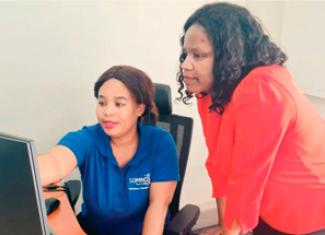Dr Nobuhle Mchunu
uses biostatistics to combat HIV and TB

As South Africa joins the global community in observing World AIDS Day on 1 December, Dr Nobuhle Mchunu beseeches South Africans to continue educating themselves and their communities about effective ways to prevent new HIV infections.
She urges those who test HIV positive to begin treatment as soon as possible and to play an active role in challenging the stigma associated with the virus.
The 32-year-old, who hails from Elangeni village in Muden, KwaZulu-Natal, works as the Senior Statistician Competent at the South African Medical Research Council (SAMRC).
As a Biostatistician, Mchunu plays a key role in helping medical professionals make data-driven decisions related to policy and health guidelines. She collaborates with researchers, scientists, and students to provide statistical expertise that supports biomedical research.
Her responsibilities include designing clinical trials and observational studies, determining appropriate sample sizes, developing statistical analysis plans, and conducting advanced statistical analyses.
These contributions are essential for maintaining the integrity and scientific validity of medical research projects. “I am currently involved in the Sixth South African HIV Prevalence, Incidence, and Behaviour (SABSSM VI) surveys, providing statistical expertise on a project that provides information on national and sub-national progress towards control of the HIV epidemic in South Africa,” she explained.
Essentially, her work focuses on improving and applying advanced statistical methods to HIV and Tuberculosis (TB) data, aiming to enhance public health evaluations and better assess the potential impact of various interventions.
Personalised approach
“My PhD research focused on joint modeling and personalised scheduling of tests in the context of HIV and TB co-infection. The key insight from my work was that screening intervals should be tailored based on an individual’s health status, promoting a more personalised and precise approach to patient care,” she explained.
“We are trying to move forward to precision medicine and stop using the blanket approach for all patients. You cannot treat people who are ill the same way you treat people who are infected but not sick,” she added.
For instance, Mchunu explained that patients who have successfully suppressed their HIV viral load and have high CD4 count, and have successfully completed their TB treatment, can safely extend their screening intervals beyond the typical six-month period. This approach not only aligns with their health needs also helps them to minimise medical costs.
On the other hand, she said those whose health is deteriorating should be monitored frequently, and the most effective way to do this is by prescribing shorter screening intervals.
“The study recommends that they get tested every three to five months to see if their health is improving. This helps the clinicians to intervene quickly and prevent serious adverse events,” she explained.
She added that this approach not only enhances current patient care protocols but also paves the way for future clinical trials and the development of biomarker-guided therapies. “These findings hold potential across various diseases, demonstrating how tailored healthcare can improve both treatment outcomes and over-all healthcare efficiency,” added Mchunu.
We are trying to move forward to precision medicine and stop using the blanket approach for all patients. You cannot treat people who are ill the same way you treat people who are infected but not sick.
To date, Mchunu has co-authored 12 peer-reviewed articles in Institute for Scientific Information (ISI)-listed journals. Her work applies advanced statistical methods to diverse areas, including the evolution of CD4 count after antiretroviral therapy initiation, the impact of TB-HIV co-infection on mortality, and most recently, studies aimed at preventing severe COVID-19.
“Over the past six years, I have refined my skills by collaborating with some of the best researchers in clinical science, ensuring that the research we conduct informs evidence-based healthcare interventions and policymaking in South Africa,” she said.
Through her work, Mchunu has made significant contributions to improving healthcare outcomes and enhancing research capacity in South Africa, which ultimately strengthens the country's public health infrastructure and bolster its ability to address critical health challenges.
Against all odds
Mchunu’s success is one for the books, as she faced adversity but refused to give up on her dreams.
She is a beneficiary of government programmes designed to uplift South Africans – a prime illustration of a true “Tintswalo” as described by President Cyril Ramaphosa in his 2024 State of the Nation Address. Among the programmes that supported her journey are the South African Social Security Agency Child Support Grant, National Student Financial Aid Scheme (NSFAS) and the National Research Foundation scholarship.
I enrolled with the University of KwaZulu-Natal (UKZN) for a Bachelor of Science (BSc) Chemistry but switched to BSc Applied Mathematics and Statistics in the second semester of first year of study,” said Mchunu.
After completing her undergraduate studies, she successfully applied for the NRF scholarship and enrolled for a BSc Honours in Statistics at UKZN, which she completed in 2016. The following year, she enrolled for a Master of Science (MSc) in Statistics at the same institution.
Mchunu also received a Master's in Biostatistics Bursary Award from the Developing Excellence in Leadership, Training, and Science in Africa Consortium for Advanced Biostatistics Training programme, which supports advanced biostatistics training across Africa. In 2018, Mchunu was accepted into the Centre for the AIDS Programme of Research in South Africa (CAPRISA) Centre of Excellence Fellowship, which she joined during her second year of her MSc studies.
Her journey was not without its challenges. In 2018, Mchunu faced the heartbreaking loss of her mother, and, in the same year, she discovered that she was pregnant. With her mother gone, her grandmother stepped in to help head the household while Mchunu balanced her studies and caring for her siblings.
Further studies
In 2019, the SAMRC’s Biostatistics Capacity Development Programme awarded Mchunu a scholarship for her PhD studies, funded in partnership with Building Academic Partnerships for Economic Development. During this period, she continued her work with CAPRISA and remained at UKZN as a PhD candidate.
The same year, she was offered a permanent entry-level position as a Statistician at the SAMRC. Two years later, she was promoted to Seasoned Statistician. In 2023, she received another promotion, this time to Senior Statistician.
In April this year, Mchunu was appointed Senior Statistician Competent, a position she currently holds. She successfully completed her PhD in September 2024.




